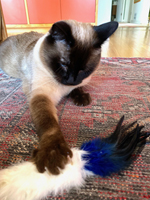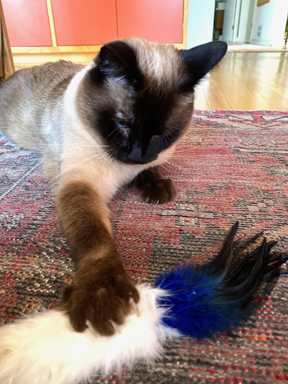Under new policy, nearly 2,000 US clinics will not perform controversial procedure

Pete 288

Photo by Daniel Spils
Cats deploy their claws to climb, scratch and trap prey or prey substitutes. A new ban on elective declawing at Banfield, BluePearl and VCA veterinary hospitals may mean more cats, like Pete, keep their claws.
Practices belonging to the largest owner of veterinary clinics in the United States no longer declaw cats as a convenience to owners, reflecting growing consensus in the profession that the procedure is cruel and unnecessary. The new policies at Banfield Pet Hospitals, VCA and BluePearl Pet Hospitals, owned by Mars Inc., affect some 2,000 veterinary clinics in the United States.
Elective declawing, known medically as non-therapeutic onychectomy, involves amputating the third phalanx, or bone, of a cat's toes, thereby removing claws it uses to scratch. Anti-declaw advocates say the procedure causes the animal acute and/or long-term pain and may result in lameness and behavioral problems.
The veterinary community historically has viewed declawing cats as a safe and reasonable way to stop scratching behaviors that might otherwise lead owners to relinquish or abandon their pets; or to assist owners whose health would be risked by a cat scratch. While a number of veterinarians still hold this view, it is not universal. Many practitioners do not perform elective declaws, and several veterinary associations oppose, for ethical reasons, declawing any cat unless it's medically necessary for the animal.
In a statement provided by email to the VIN News Service, Dr. Jennifer Welser, Mars chief medical and quality officer, explained the decision: "At Mars Veterinary Health, we believe every pet deserves a safe, loving and supportive home that enables appropriate expression of natural behaviors. After careful consideration, medical leadership aligned on a new declaw position, and elective declaw surgery is no longer offered at U.S. Mars Veterinary Health practices … unless determined to be medically necessary."
Banfield's Feline Declaw Position Statement, issued in January, says: "Current evidence does not support the use of elective declawing surgery as an alternative to relinquishment, abandonment, or euthanasia." VCA followed last week with a policy that hews closely to Banfield's.
Banfield's statement also points out that its position aligns with that of the American Association of Feline Practitioners (AAFP) and declaw bans in a number of U.S. cities and other local jurisdictions.
AAFP in a statement from 2017 came out against elective declawing, calling it "ethically controversial" and "NOT a medically necessary procedure for cats in most instances." The American Animal Hospital Association also opposes the practice.
Some governments are taking the decision out of veterinarians' hands entirely. Last summer, New York became the first state to make it illegal to perform non-therapeutic onychectomies. Anyone in New York who performs the procedure for a non-medical reason is subject to a fine of up to $1,000.
Nine states — Arizona, Florida, Maryland, Massachusetts, Michigan, Minnesota, New Jersey, Rhode Island and West Virginia — currently are considering legislation banning declawing, according to Alley Cat Allies, a nonprofit advocacy organization working to end the procedure.
At least 10 municipalities have criminalized feline onychectomy. Eight are in California alone: Berkeley, Beverly Hills, Burbank, Culver City, Los Angeles, San Francisco, Santa Monica and West Hollywood (which was first, in 2003). An effort to take the anti-declaw momentum further with a statewide ban died in committee last month. The California Veterinary Medical Association and the California Veterinary Medical Board opposed the bill. In general, the profession does not want to see lawmakers directing medical decisions.
Among cities, Denver and St. Louis also have banned the procedure. Elsewhere, declawing is outlawed in at least 41 countries, including Switzerland, Israel and the United Kingdom, according to Alley Cat Allies.
The pressure around the issue within the U.S. veterinary profession was evident during a meeting in early January of the American Veterinary Medical Association's House of Delegates. It took nearly two hours and multiple revisions before delegates could agree on an updated position, which discourages the practice while also emphasizing that the decision to declaw should remain between owners and their veterinarians.
The approved statement reads: "The AVMA discourages the declawing (onychectomy) of cats as an elective procedure and supports non-surgical alternatives to the procedure. The AVMA respects the veterinarian's right to use professional judgment when deciding how to best protect their individual patients' health and welfare. Therefore, it is incumbent upon the veterinarian to counsel the owner about the natural scratching behavior of cats, the alternatives to surgery, as well as the details of the procedure itself and subsequent potential complications. Onychectomy is a surgical amputation and if performed, multi-modal perioperative pain management must be utilized."
Jennifer Fiala contributed to this report.
Update: Maryland became the second state to make it illegal to perform non-therapeutic onychectomies. Maryland Gov. Larry Hogan signed the cat declaw bill into law on April 21, 2022.